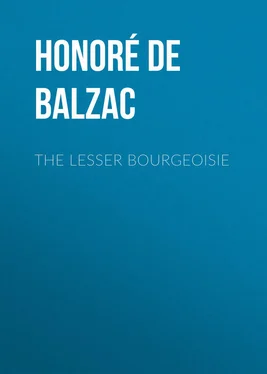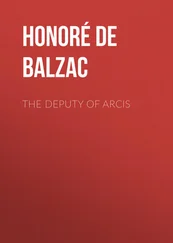Honoré Balzac - The Lesser Bourgeoisie
Здесь есть возможность читать онлайн «Honoré Balzac - The Lesser Bourgeoisie» — ознакомительный отрывок электронной книги совершенно бесплатно, а после прочтения отрывка купить полную версию. В некоторых случаях можно слушать аудио, скачать через торрент в формате fb2 и присутствует краткое содержание. Жанр: literature_19, foreign_antique, foreign_prose, на английском языке. Описание произведения, (предисловие) а так же отзывы посетителей доступны на портале библиотеки ЛибКат.
- Название:The Lesser Bourgeoisie
- Автор:
- Жанр:
- Год:неизвестен
- ISBN:нет данных
- Рейтинг книги:3 / 5. Голосов: 1
-
Избранное:Добавить в избранное
- Отзывы:
-
Ваша оценка:
- 60
- 1
- 2
- 3
- 4
- 5
The Lesser Bourgeoisie: краткое содержание, описание и аннотация
Предлагаем к чтению аннотацию, описание, краткое содержание или предисловие (зависит от того, что написал сам автор книги «The Lesser Bourgeoisie»). Если вы не нашли необходимую информацию о книге — напишите в комментариях, мы постараемся отыскать её.
The Lesser Bourgeoisie — читать онлайн ознакомительный отрывок
Ниже представлен текст книги, разбитый по страницам. Система сохранения места последней прочитанной страницы, позволяет с удобством читать онлайн бесплатно книгу «The Lesser Bourgeoisie», без необходимости каждый раз заново искать на чём Вы остановились. Поставьте закладку, и сможете в любой момент перейти на страницу, на которой закончили чтение.
Интервал:
Закладка:
“I have not yet had the pleasure of hearing you at the Palais,” said Vinet to Monsieur de la Peyrade.
“I am advocate for the poor, and I plead only before the justice of peace,” replied la Peyrade.
Mademoiselle Thuillier, as she listened to young Vinet’s theory of the necessity of spending an income, assumed a distant air and manner, the significance of which was well understood by Dutocq and the young Provencal. Vinet left the house in company with Minard and Julien the advocate, so that the battle-field before the fire-place was abandoned to la Peyrade and Dutocq.
“The upper bourgeoisie,” said Dutocq to Thuillier, “will behave, in future, exactly like the old aristocracy. The nobility wanted girls with money to manure their lands, and the parvenus of to-day want the same to feather their nests.”
“That’s exactly what Monsieur Thuillier was saying to me this morning,” remarked la Peyrade, boldly.
“Vinet’s father,” said Dutocq, “married a Demoiselle de Chargeboeuf and has caught the opinions of the nobility; he wants a fortune at any price; his wife spends money regally.”
“Oh!” said Thuillier, in whom the jealousy between the two classes of the bourgeoisie was fully roused, “take offices away from those fellows and they’d fall back where they came.”
Mademoiselle was knitting with such precipitous haste that she seemed to be propelled by a steam-engine.
“Take my place, Monsieur Dutocq,” said Madame Minard, rising. “My feet are cold,” she added, going to the fire, where the golden ornaments of her turban made fireworks in the light of the Saint-Aurora wax-candles that were struggling vainly to light the vast salon.
“He is very small fry, that young substitute,” said Madame Minard, glancing at Mademoiselle Thuillier.
“Small fry!” cried la Peyrade. “Ah, madame! how witty!”
“But madame has so long accustomed us to that sort of thing,” said the handsome Thuillier.
Madame Colleville was examining la Peyrade and comparing him with young Phellion, who was just then talking to Celeste, neither of them paying any heed to what was going on around them. This is, certainly, the right moment to depict the singular personage who was destined to play a signal part in the Thuillier household, and who fully deserves the appellation of a great artist.
CHAPTER V. A PRINCIPAL PERSONAGE
There exists in Provence, especially about Avignon, a race of men with blond or chestnut hair, fair skin, and eyes that are almost tender, their pupils calm, feeble, or languishing, rather than keen, ardent, or profound, as they usually are in the eyes of Southerners. Let us remark, in passing, that among Corsicans, a race subject to fits of anger and dangerous irascibility, we often meet with fair skins and physical natures of the same apparent tranquillity. These pale men, rather stout, with somewhat dim and hazy eyes either green or blue, are the worst species of humanity in Provence; and Charles-Marie-Theodose de la Peyrade presents a fine type of that race, the constitution of which deserves careful examination on the part of medical science and philosophical physiology. There rises, at times, within such men, a species of bile, – a bitter gall, which flies to their head and makes them capable of ferocious actions, done, apparently, in cold blood. Being the result of an inward intoxication, this sort of dumb violence seems to be irreconcilable with their quasi-lymphatic outward man, and the tranquillity of their benignant glance.
Born in the neighborhood of Avignon, the young Provencal whose name we have just mentioned was of middle height, well-proportioned, and rather stout; the tone of his skin had no brilliancy; it was neither livid nor dead-white, nor colored, but gelatinous, – that word can alone give a true idea of the flabby, hueless envelope, beneath which were concealed nerves that were less vigorous than capable of enormous resistance at certain given moments. His eyes, of a pale cold blue, expressed in their ordinary condition a species of deceptive sadness, which must have had great charms for women. The forehead, finely cut, was not without dignity, and it harmonized well with the soft, light chestnut hair curling naturally, but slightly, at its tips. The nose, precisely like that of a hunting dog, flat and furrowed at the tip, inquisitive, intelligent, searching, always on the scent, instead of expressing good-humor, was ironical and mocking; but this particular aspect of his nature never showed itself openly; the young man must have ceased to watch himself, he must have flown into fury before the power came to him to flash out the sarcasm and the wit which embittered, tenfold, his infernal humor. The mouth, the curving lines and pomegranate-colored lips of which were very pleasing, seemed the admirable instrument of an organ that was almost sweet in its middle tones, where its owner usually kept it, but which, in its higher key, vibrated on the ear like the sound of a gong. This falsetto was the voice of his nerves and his anger. His face, kept expressionless by an inward command, was oval in form. His manners, in harmony with the sacerdotal calmness of the face, were reserved and conventional; but he had supple, pliant ways which, though they never descended to wheedling, were not lacking in seduction; although as soon as his back was turned their charm seemed inexplicable. Charm, when it takes its rise in the heart, leaves deep and lasting traces; that which is merely a product of art, or of eloquence, has only a passing power; it produces its immediate effect, and that is all. But how many philosophers are there in life who are able to distinguish the difference? Almost always the trick is played (to use a popular expression) before the ordinary run of men have perceived its methods.
Everything about this young man of twenty-seven was in harmony with his character; he obeyed his vocation by cultivating philanthropy, – the only expression which explains the philanthropist. Theodose loved the People, for he limited his love for humanity. Like the horticulturist who devotes himself to roses, or dahlias, or heart’s-ease, or geraniums, and pays no attention to the plants his fancy has not selected, so this young La Rochefoucault-Liancourt gave himself to the workingmen, the proletariat and the paupers of the faubourgs Saint-Jacques and Saint-Marceau. The strong man, the man of genius at bay, the worthy poor of the bourgeois class, he cut them off from the bosom of his charity. The heart of all persons with a mania is like those boxes with compartments, in which sugarplums are kept in sorts: “suum cuique tribuere” is their motto; they measure to each duty its dose. There are some philanthropists who pity nothing but the man condemned to death. Vanity is certainly the basis of philanthropy; but in the case of this Provencal it was calculation, a predetermined course, a “liberal” and democratic hypocrisy, played with a perfection that no other actor will ever attain.
Theodose did not attack the rich; he contented himself with not understanding them; he endured them; every one, in his opinion, ought to enjoy the fruits of his labor. He had been, he said, a fervent disciple of Saint-Simon, but that mistake must be attributed to his youth: modern society could have no other basis than heredity. An ardent Catholic, like all men from the Comtat, he went to the earliest morning masses, and thus concealed his piety. Like other philanthropists, he practised a sordid economy, and gave to the poor his time, his legal advice, his eloquence, and such money as he extracted for them from the rich. His clothes, always of black cloth, were worn until the seams became white. Nature had done a great deal for Theodose in not giving him that fine manly Southern beauty which creates in others an imaginary expectation, to which it is more than difficult for a man to respond. As it was, he could be what suited him at the moment, – an agreeable man or a very ordinary one. Never, since his admission to the Thuilliers’, had he ventured, till this evening, to raise his voice and speak as dogmatically as he had risked doing to Olivier Vinet; but perhaps Theodose de la Peyrade was not sorry to seize the opportunity to come out from the shade in which he had hitherto kept himself. Besides, it was necessary to get rid of the young substitute, just as the Minards had previously ruined the hopes of Monsieur Godeschal. Like all superior men (for he certainly had some superiority), Vinet had never lowered himself to the point where the threads of these bourgeois spider-webs became visible to him, and he had therefore plunged, like a fly, headforemost, into the almost invisible trap to which Theodose inveigled him.
Читать дальшеИнтервал:
Закладка:
Похожие книги на «The Lesser Bourgeoisie»
Представляем Вашему вниманию похожие книги на «The Lesser Bourgeoisie» списком для выбора. Мы отобрали схожую по названию и смыслу литературу в надежде предоставить читателям больше вариантов отыскать новые, интересные, ещё непрочитанные произведения.
Обсуждение, отзывы о книге «The Lesser Bourgeoisie» и просто собственные мнения читателей. Оставьте ваши комментарии, напишите, что Вы думаете о произведении, его смысле или главных героях. Укажите что конкретно понравилось, а что нет, и почему Вы так считаете.












